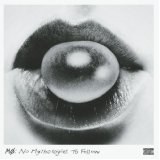 On paper at least it would appear that MØ is unlikely to deviate much from what is a well-established and superior brand of Scandi-pop. With this album being three years in the making, the Copenhagen based twenty-five year old has had time to hone her preferred blend of r’n’b pop with trap leanings and an occasional wander into 1960s reverb-heavy girl group territory. Her competition is undoubtedly strong; Lykke Li, Annie, Robyn and Oh Land to name a few of the female singers who have already demonstrated their worth in the genre over the last decade. But MØ can thankfully hold her own more often than not on this, her debut album, “No Mythologies to Follow”.
On paper at least it would appear that MØ is unlikely to deviate much from what is a well-established and superior brand of Scandi-pop. With this album being three years in the making, the Copenhagen based twenty-five year old has had time to hone her preferred blend of r’n’b pop with trap leanings and an occasional wander into 1960s reverb-heavy girl group territory. Her competition is undoubtedly strong; Lykke Li, Annie, Robyn and Oh Land to name a few of the female singers who have already demonstrated their worth in the genre over the last decade. But MØ can thankfully hold her own more often than not on this, her debut album, “No Mythologies to Follow”.
Album opener “Fire Rides”, one of the new songs which represent the minority here, as over half the album has already been released, is a perfect introduction to MØ’s style and sound. Following a near acapella flurry of swooping, angelic vocals, stop-start post Timbaland beats hit hard against the melancholic melody line before a rave synth adds another, more angular dimension to the chorus. It may sound crowded but it’s a sublime merging of styles. Most impressive of all though are MØ’s vocals, full bodied and soulful with an impressive and expressive range that her contemporaries can’t match. The apocalyptic metaphors on “Fire Rides” are bought to life with her possessed performance on the haunted and yearning verses:
‘What’s it gonna be with the violence?
What’s it gonna be when the fire rides in?
What’s it gonna be when the sound of you and I die out?’
“Maiden”, “Pilgrim” and “Waste of Time” are all previous singles and further represent MØ’s fixation with the music she grew up with. Much like Grimes, contemporary futuristic r’n’b and hip hop have been essential influences to her along with electronic pop music and an ability to subvert these genres subtly and without irony but with heart; this is her specialty. “Maiden” introduces a classic nylon-strung guitar sound that crops up more than once in the album’s playing time and it’s to her credit that she applies these odd stylistic flourishes to her sound and makes it something that is identifiable to her and without contrivance. Producer superstar Diplo appears on the brassy and low-slung “XXX 88” and it’s maybe not surprising that it’s the most commercial moment here but also completely in keeping with the sonic themes of the album. “Don’t Wanna Dance” and the slowly chiming “Never Wanna Know” in particular pay a brilliant homage to Motown and girl group dilemmas and sonics. Both tracks are wonderfully conceived and a perfect for MØ’s longing and alienated vocals, “Never Wanna Know” has a divine spoken interlude that draws the line from The Shangri-Las to All Saints, it may be an easy pull but it certainly hits in all the right places
‘All of a sudden I was brain dead and rotten
With thoughts of you and I
And I wanted to ‘goodbye’ you
But the nights are so cold
How I missed your human soul
I would never let you go if I’d been a little older’
he less successful songs here, and there only a few, are also the newer ones. “Red in the Grey” has a pretty straight forward trap arrangement but is more of a re-tread of earlier material rather than a fresh update. “Dust is Gone” continues with the sixties thread but the lack of a strong song and Lana Del Rey aping render it redundant karaoke. The clanking and clapping “Walk this Way” and the gorgeous “Slow Love” with its opulent, misty funk fare much better. Compare any of these tracks though to the older and eccentric “Glass”, the closing song here, with its deeply disconcerting festive synth hook, massive pop chorus and general oddness, and these tracks fail to fully measure up.
“No Mythologies To Follow” may not be as instantly gratifying as one may have expected given a genre that all too often and easily is written off as disposable. This is an album that initially is difficult to warm to and a fairly steady mid tempo throughout can provoke a feeling of sameness. This proves to be a strength as opposed to any kind of weakness however as repeated listens reward enormously as buried melodies and hidden embellishments are excitingly revealed over time. MØ has already managed to establish her own style and found a voice which allows her access to the hallowed music hall of Swedish Pop (a copy of Abba’s “The Visitors” is given to all wannabes as homework) but she also cleverly sets herself apart from her contemporaries effortlessly and with some aplomb. MØ is indeed something quite special: an awkward and talented woman challenging her inhibitions and desires through frequently beautiful and slow burning music that is, at times, equally awkward.


